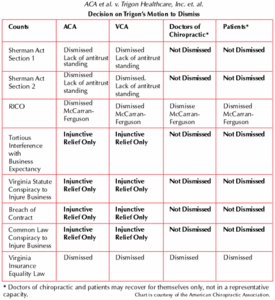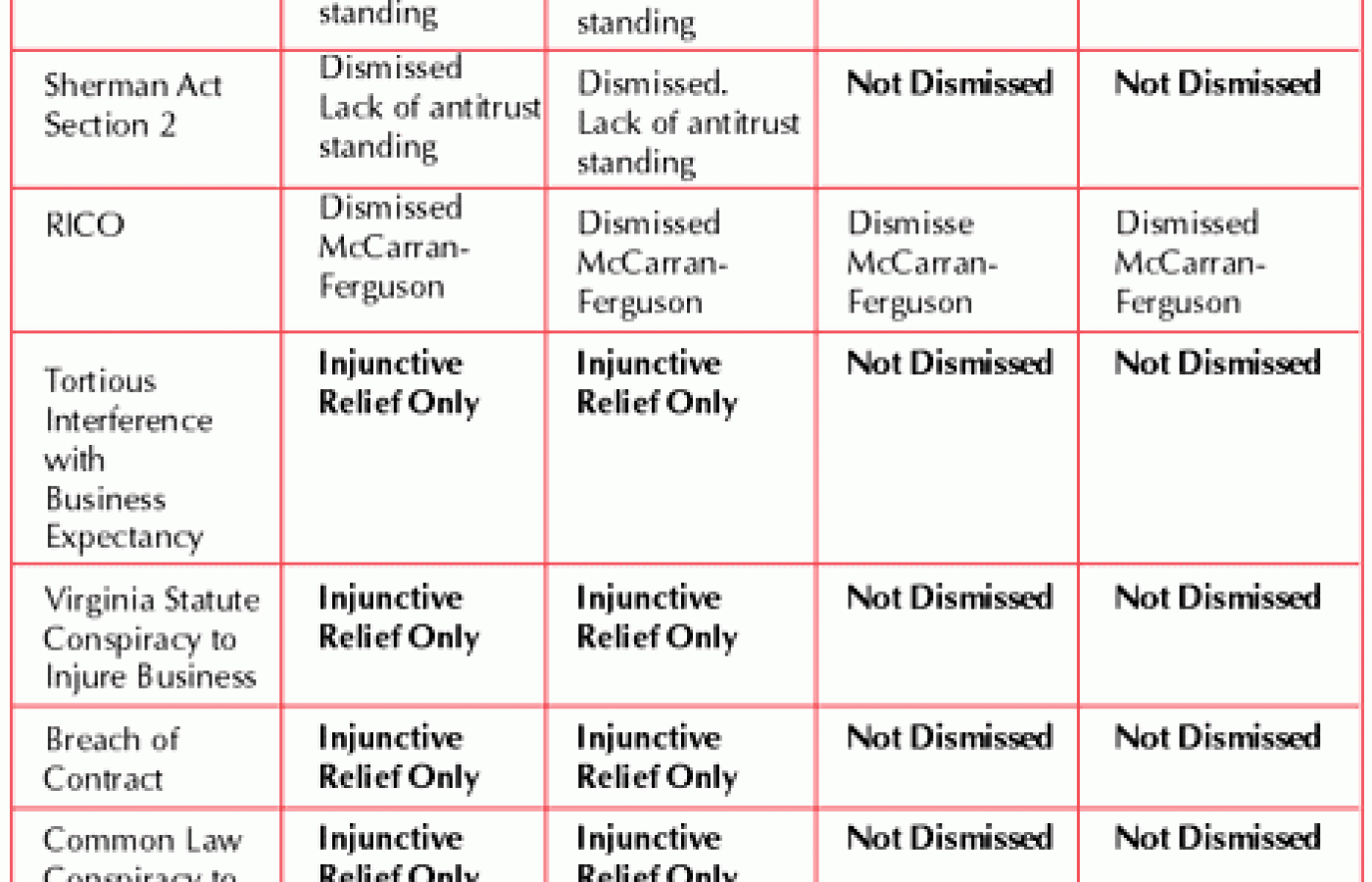It’s a new year and many chiropractors are evaluating what will enhance their respective practices, particularly as it relates to their bottom line. One of the most common questions I get is: “Do I need to be credentialed to bill insurance, and what are the best plans to join?” It’s a loaded question – but one every DC ponders. Whether you're already in-network or pondering whether to join, here's what you need to know.
Judge Rules on Trigon's Motion to Dismiss ACA Lawsuit
In August 2000, the ACA, the Virginia Chiropractic Association (VCA), five chiropractors, and 18 chiropractic patients filed suit against Trigon and the national Blue Cross/Blue Shield Association (ACA, et al. v. Trigon Healthcare, et al.). The plaintiffs alleged that Trigon engaged in conspiracy, racketeering, extortion, mail fraud and antitrust violations.
On July 23, U.S. District Judge James Jones (western district of Virginia) ruled on Trigon's motions to dismiss the allegations. The judge allowed six counts to stand, but dismissed four counts, and ordered "injunctive relief only" for the ACA and VCA plaintiffs. (See the chart on page 6 that details the judge's ruling on all the counts.)
In a conference call to the chiropractic media a day after the judge's rulings, George McAndrews, attorney for the plaintiffs, said he was "optimistically ecstatic" about the rulings, and explained the significance of the judgments, and the next steps for the plaintiffs.
"The judge ruled that the ACA and the VCA, since they are not directly injured, may not seek damages, but only seek injunctive relief," explained Mr. McAndrews. However, the DCs and patients who are plaintiffs in the suit can seek damages. Because of the injunction relief ruling, Mr. McAndrews is "contemplating making this into a class-action suit of all the chiropractors in Virginia, and expanding this into a suit of all patients of chiropractors that are directly or indirectly insured by Trigon there."
Judge Jones declared that the plaintiffs "have pleaded sufficient facts to satisfy the personal stake exception, namely, that the agents of Trigon, as competing physicians, had a direct interest in the market for health care services, which was distinct and independent from their roles as agents of Trigon."
The next phase of the case is "discovery." Mr. McAndrews elaborated: "My experience is that the discovery period in a case like this could very well run for 12 to 15 months. That will mean we'll have to track down not only Trigon documents, but those of medical doctors in the field, other related Blue Cross Blue Shield plans, documents relating to regional conventions of Blue Cross Blue Shield, because we have noticed an alarming similarity between the way BCBS plans treat or mistreat DCs and their patients."
Under discovery, Mr. McAndrews seeks to prove that Trigon "funnels business to the medical world" by putting a $500 cap on all chiropractic treatment during the year. Patients are then encouraged to go to MDs for their back problems. The MDs have no such cap. "That is a funneling of business from the most skilled to the least skilled providers," asserted Mr. McAndrews. "We have a wealth of documents and studies that we'll be able to rely on to prove that those patients are prejudiced when they are forced to take their health problems from a chiropractor to a medical physician who isn't skilled in that area.
"If you look at their advisory boards, their policymaking boards, and their medical directors, they utilize the medical doctor with the medical doctors narrowly focused, restricted in health education, to determine whether or not chiropractic care should be given or is appropriate. We're going to have that aired out with this case."
The "obstinacy of the medical directors, and the insulting conduct toward the chiropractors" displayed by Trigon and the medical physicians that sit on the policymaking boards will also be shown, according to Mr. McAndrews.
"We have a lot more arrows in our quiver than we did in the Wilk case because so many more medical physicians are referring to doctors of chiropractic," Mr. McAndrews pointed out. "To my own knowledge, many more medical physicians are going to doctors of chiropractic.

It's not the same as it was 30 years ago when it was considered unethical for medical physicians and doctors of chiropractic to be in the same room together."
Mr. McAndrews warned chiropractic state associations to be careful if they are involved in similar lawsuits, or negotiating health care contracts. "Keep Tom Daley (ACA general council) informed of what is going on, so that we won't be blind-sided by a resolution on a local level. Be very careful that you don't give away the kitchen sink. Virginia was picked for a reason. The profession is a big family. What you are negotiating can, in one way or another, affect the rest of the family. The insurance world represents billions of dollars. Keep your eye on what money goes to the provider. Get somebody who knows insurance. We're not fighting over health care now, we're fighting over money and how it is distributed. Be very careful when you sign something that you know all of the ramifications."



